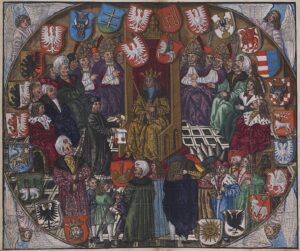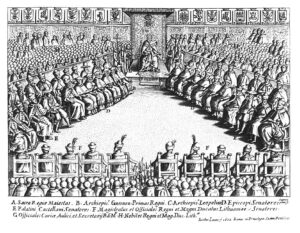Political consultative assemblies, common in late medieval monarchies throughout Europe, faced transformative changes between 1500 and 1700. Parliaments, States, Estates, Diets, Cortes varied tremendously in their organization, customs, and functions. Yet they shared a transnational inheritance of ideas and methods of deliberation, consultation and representation that added up to a common European tradition.

The interdisciplinary international conference “Recovering Europe’s Parliamentary Culture, 1500-1700: Concepts, Methods, Approaches” will explore the culture of early modern Europe’s political assemblies, and ask how it was expressed in language, writing, images, institutions, and symbolic practices. We invite papers from scholars of early modern history, political philosophy, intellectual history, literature, classical tradition, arts and material culture to investigate the political, literary and visual discourses and shared experiences of representative political assemblies across Europe during the ‘Long Reformation’.
We particularly welcome papers that discuss the following topics:
– What is parliamentary culture? Or should we perhaps speak of ‘parliamentary cultures’? What do we gain by approaching it from a comparative, interdisciplinary perspective?
– Which research perspectives and methods are best suited to comparative studies of parliamentary culture in early modern Europe?
– What are the commonalities and differences in the languages used to describe parliamentary practice in our period, and what are the political ideas that underpinned or served to justify such practices in various countries?
– How was the power and character of early modern political assemblies conceptualized in imaginative as well as more obviously political writing?
– How was their work recorded, formally and informally, and historicized?
– How were they compared with each other by contemporaries?
– What was distinctive about the rhetoric of parliamentary speeches and/or of parliamentary diaries? How did this cultural dimension of political assemblies change in the course of the early modern period?
– How do modern parliaments use their early modern parliamentary cultural heritage?
– How is early modern parliamentary culture still reflected in cultural heritage sites today?
– How did this cultural dimension of political assemblies change in the course of the early modern period?

The conference will include two interdisciplinary round table discussions: ‘What is Parliamentary Culture’ and ‘Early Modern Parliaments and their Modern Heritage’
Confirmed speakers include Paulina Kewes (Jesus College, Oxford), Paul Seaward (History of Parliament Trust, London), Robert Frost (University of Aberdeen), Dorota Pietrzyk-Reeves (Jagiellonian University in Krakow).
Conference fee: 150 Euro
Proposals for papers of 15-20 minutes should be submitted to: jim.vandermeulen@ell.ox.ac.uk by 31 January 2022. They should not exceed 200 words. Please also submit a short biographical note. We also welcome proposals for panels of 3-4 15 minute papers. Panel proposals should be submitted by the panel convenor and should include an abstract for each paper (200 words max), a rationale for the panel as a whole (max 150 words), and biographical notes and email addresses for all proposed delegates (max 150 words each). Successful applicants will be informed by 24 February 2022.
The conference is partially supported by the Europaeum, a network of 18 of Europe’s leading universities. Postgraduate students at Europaeum member universities should additionally complete a cover sheet [need to add link], attach a 2 page CV and give the name of a referee if they wish to be considered for a funded place at the conference. These will be awarded on a competitive basis according to merit.




